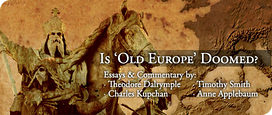Lead Essay
Old Europe may not be doomed, though it is “sleepwalking to further relative decline,” says Theodore Dalrymple. “The principle motor of Europe’s current decline is,” he argues, “its obsession with social security.” If Europe is to have a fighting chance, it must overcome a politics in which “personal and sectional interest has become all-powerful” and “the goal of everyone is to parasitize everyone else.”
Response Essays
According to historian Timothy Smith, author of France in Crisis, the main problem of Old Europe is that overregulated labor markets, alleged to “humanize” capitalism and promote “solidarity,” instead work to consolidate economic privileges for tenured labor unionists and state employees, and exclude broad swathes of the population, especially immigrants, from the work force. Smith is careful to distinguish the relative stagnation of France, Germany, and Italy from their more successful Scandanavian counterparts, and argues against Dalrymple that the U.K. is really in pretty good shape.
Disagreeing sharply with Theodore Dalrymple’s grim diagnosis, Georgetown University international affairs professor and Council on Foreign Relations senior fellow Charles Kupchan maintains that “it is simply not the case that the continent is populated primarily by sclerotic, dysfunctional economies on their last gasp.” However, Kupchan argues that Dalrymple’s essay “considerably underestimates … the challenge of integrating Muslim immigrants into European society.” The Paris riots and the Danish cartoon imbroglio demonstrate that Europe has “embraced multiculturalism in fact, but not yet in spirit.”
In her reply to Dalyrmple’s lead essay, the Washington Post’s Anne Applebaum lists “three factors which could, over the next decade, help reverse Europe’s course.” Market-friendly leaders, “an acknowledgment of the possibilities presented by the new members of the European Union,” and ditching “their increasingly bizarre obsession with the evil United States,” would, Applebaum argues, go a long way to “help Europe escape its current economic and psychological slump.”
The Conversation
Related at Cato
Olaf Gersemann, Cowboy Capitalism: European Myths, American Reality (Washington, DC: Cato Institute, 2003).
Olaf Gersemann, Free to Adjust, Cato Daily Dispatch, July 23, 2004.
Richard W. Rahn, Europe’s New Oppressors, Cato Daily Dispatch, June 2, 2004.
José Piñera, Will the Pension Time Bomb Sink the Euro? [pdf], Cato Journal, Volume 24 Numbers 1-2, Spring/Summer 2004.
Marian L. Tupy, Review of ‘European Integration, 1950-2003: Superstate or New Market Economy?’ by John Gillingham, Cato Journal, Volume 24 Numbers 1-2 Spring/Summer 2004.
Marian L. Tupy, EU Enlargement: Costs, Benefits, and Strategies for Central and Eastern European Countries, Cato Policy Analysis Number 489, September 18 2003.
Marian L. Tupy, The European Rift Goes Beyond Politics, Cato Daily Dispatch, February 26 2003.
William G. Shipman, ‘Old Europe’ and Getting Older, Cato Daily Dispatch, May 14, 2003.
Patrick Basham and Marian L. Tupy, Europe’s New Constitution: Philadelphia It Is Not, Cato Daily Dispatch, March 7, 2003.
James M. Buchanan, An American Perspective on Europe’s Constitutional Opportunity, Cato Journal, Volume 10, Number 3, 1991.

